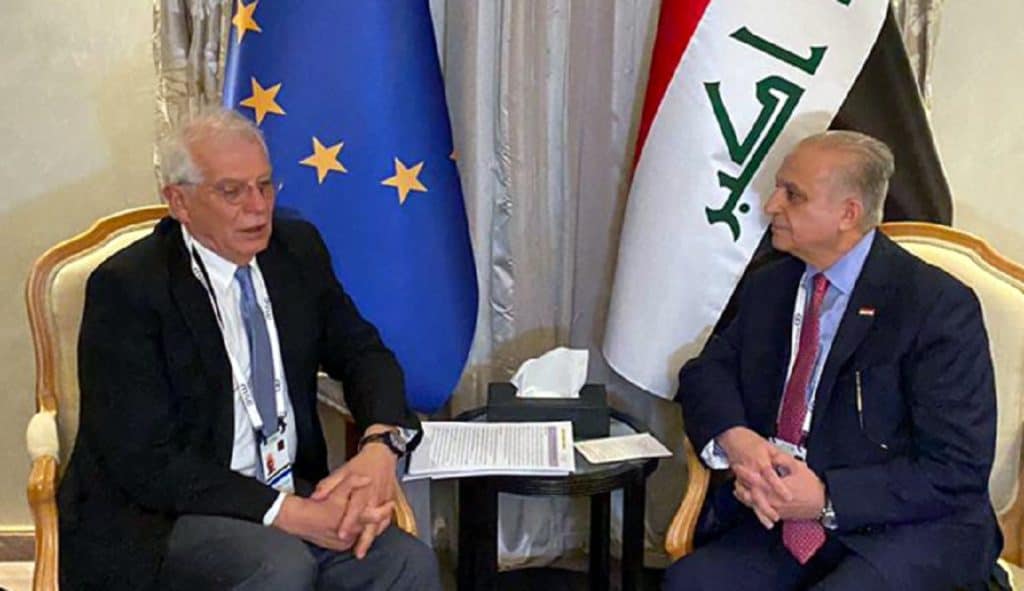By Denis Korkodinov
The European Union plays a key role in the economic development of Iraq. However, relations between the EU and Baghdad are currently extremely difficult. This problem is associated not only with the coronavirus pandemic and the global economic crisis, but also with the mutual distrust of the parties.
The situation is complicated by the fact that the international community and the United States, first of all, required European countries to impose sanctions against Iraq for supporting Iranian politics in the Middle East. In addition, the EU is overly concerned that the Iraqi economy is almost 80 percent focused on Iran and China, which significantly complicates Western investments.
According to World Bank information, foreign trade currently accounts for approximately 4/5 of official Baghdad’s small domestic product. At the same time, a significant part of exports is crude oil and its refined products. Meanwhile, the share of European countries in the Iraqi economy is declining, despite the fact that Iraq needs, first of all, food products and machinery from Europe. Should Tehran and Beijing further strengthen their economic positions in Baghdad, the EU may decide to introduce additional international sanctions. Such measures complicate the implementation of official Baghdad’s trade policies and market development. Due to the fact that the Iraqi leadership is not inclined to limit the influence of Iran and China, it is highly likely that the economic situation in Iraq will be extremely persistent under pressure from the EU in the near future.
It is worth noting that during the reign of Saddam Hussein, Iraq was in opposition to the Ayatollah regime. However, starting in 2003, the situation began to change rapidly. Tehran was able, including with the participation of the United States, to weaken the military potential of official Baghdad and form a government that is completely loyal to Iranian politics in the region. As a result of this, Iraq has completely turned into an Iranian creature, deprived of the opportunity to make decisions that would be contrary to the interests of the “Guardian Corps of the Islamic Revolution” and the will of the Supreme Ayatollah of Iran.
Baghdad’s economic dependence on Tehran is a major element of the influence of the Ayatollah regime. In the implementation of this goal, Iran has spent more than 20 years and significant material resources. As a result of this, Iraq was extremely vulnerable in the sense that any attempts to limit Iranian dominance policy lead to instability in all areas of Iraqi reality.
Tehran has become absolutely unhindered to influence the political and economic elite of Iraq, primarily in order to block the intervention of Western countries and contain US policy in the Middle East. The Shiite majority in the Iraqi parliament and the support of the Hashd al-Shaabi militia, in this case, are helping shape the Iranian lobby in Baghdad.
Among other things, through the spread of the Iranian model of government in Iraq, it has become possible to provide financial assistance and the distribution of economic orders in the interests of Iranian-supported commercial and military organizations. Thanks to this, in many parts of Iraq, Ayatollah intelligence services are officially represented, which are engaged not only in controlling political mood within the country, but also in neutralizing European participation in the economy of the Middle East, which causes serious concern for the European Union, whose ability to influence Iraq has become limited.
Despite the coronavirus pandemic is threatening the entire international community, the EU may continue to exert pressure on Iran with economic sanctions. Of course, this combination of circumstances affects the interests of Iraq, whose well-being almost entirely depends on Tehran. Under such conditions, relations between the EU and Baghdad cannot develop constructively.
(The views expressed in this article belong only to the author and do not necessarily reflect the views of World Geostrategic Insights).







